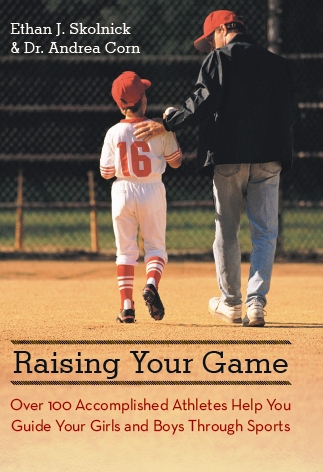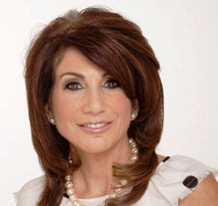While 2013 does not mark a milestone anniversary for Title IX, the 1972 legislation that started to level the athletic playing field for girls and young women in America, it's never a bad time to recognize and review how far the country has come. The landmark law received a lot of increased attention this summer, due to the "Nine for IX" documentary series which aired on ESPN and its sister networks.
When collaborating on our book, "Raising Your Game: Over 100 Accomplished Athletes Help You Guide Your Girls and Boys Through Sports," we recognized the increased interest that girls now have in sports.
That is why we included prominent current and former female on our interview list, to share their childhood anecdotes and adult insights with moms, dads, grandmas, grandpas, aunts, uncles and coaches everywhere.
A couple of universal lessons stood above the rest.
First, they told us to make sure it's fun first, without making the child feel cornered into playing sports. Make sure the child believes you are in his or her corner, showing your support by showing up and showing interest but also showing restraint.
Second, they all emphasized how important it was for girls to know that it's just as normal and healthy for them to participate and compete as it has always been for boys.
In our interviews with elite athletes like Karrie Webb (golf), Mary Joe Fernandez (tennis), Sanya Richards-Ross (track), Julie Foudy and Brandi Chastain (soccer) and others, they reminded us that some girls may be reluctant to play sports because they have heard it's not "girly," or because they're shy or awkward, or even a bit overweight. Adults need to help them shed the stigma, and their fears, they said.
Here's what they told us:
"We are building you as a young person, like young boys have been able to build themselves as a long time," said Brandi Chastain of the role of sports. "And the by-product of that is a girl is going to feel good about the things they do, and that is going to carry over into other things in their life."
Karrie Webb accompanied her grandparents to the golf course when only four years old, whacking the ball with her plastic clubs.
Mary Joe Fernandez slammed tennis balls against her refrigerator and bedroom wall.
Sonya Richards-Ross ran for fun, until she realized she was good at it: "Then I wanted to train and get better."
July Foudy was already driven to succeed in school when, in recess, she found this fun thing called soccer. "I liked being active, I think," Foudy said. "I was really hyper and social. So it brought those two elements together. It was physically demanding and you were surrounded by teammates. I loved being competitive, and it was kind of an outlet for me where I wasn't being looked upon as a freak."
Still, Foudy -- the former World Cup captain -- fully recognizes that some girls find themselves in a challenging spot, "to come to grips with being competitive" in a society that typically reserves those expectations for boys. Through the Julie Foudy Leadership Academy, she de-emphasizes the more destructive elements of youth sports (notably, parents living vicariously through children), while trying to teach the girls how sports participation can assist in them "finding their voices and becoming stronger women. To be OK with who you are, to understand that we don't all have to look the same or be the same - that is OK. You can be different and that is good."
That's true whether in comparison to girls who play sports, or to girls who don't.
As a child, basketball star Swin Cash idolized Michael Jordan, and tried to imitate his intensity and work ethic. That has served her well over the years, as she's won an Olympic gold medal as well as NCAA and WNBA championships. She's aware that not all girls feel free to express themselves as she did, and has.
"For boys, it's expected," Cash said. "But if you look at it, intensity isn't based on your gender. If we can get girls to realize that if they want to be cute and have a ponytail and wear a little bit of makeup, I do those things when I play as well. But it's about the outcome, and how you play the game."
In the end, it's about what inspired Title IX: the belief that girls and women should have an equal opportunity to enjoy, and enrich themselves through, sports.
 Andrea
Corn, Psy. D., is a psychologist in private practice in Lighthouse
Point, Florida and co-author with Ethan J. Skolnick of the new book, "Raising Your Game - Over 100 Accomplished Athletes Help You Guide Your Girls and Boys Through Sports." You can like Dr. Corn on Facebook and follow her on Twitter @DocACorn.
Andrea
Corn, Psy. D., is a psychologist in private practice in Lighthouse
Point, Florida and co-author with Ethan J. Skolnick of the new book, "Raising Your Game - Over 100 Accomplished Athletes Help You Guide Your Girls and Boys Through Sports." You can like Dr. Corn on Facebook and follow her on Twitter @DocACorn.









